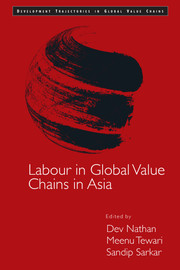Book contents
- Frontmatter
- Contents
- Figures
- Tables
- Foreword
- Preface
- Acknowledgements
- Introduction
- Captive Governance
- 2 Achieving Better Work for Apparel Workers in Asia
- 3 Improving Wages and Working Conditions in the Bangladesh Garment Sector: The Role of Horizontal and Vertical Relations
- 4 Bargaining in Garment GVCs: The Asia Floor Wage
- 5 Fresh Produce Markets, Standards, and Dynamics of Labour: Grapes in India
- 6 The ‘Zero-Fee’ Tour: Price Competition and Chain Downgrading in Chinese Tourism
- 7 Restricting Competition to Reduce Poverty: Impact of the Tourism Value Chain in an Upland Economy in China
- 8 Restructuring of Post-crisis GVCs: Tourism in Bali, Indonesia
- 9 Dynamics of Labour-intensive Clusters in China: Wage Costs and Moving Inland
- 10 Migrant Labour in Global Value Chains in Asia
- Modular Governance
- Relational Governance
- Conclusions
- Notes on Contributors
- Index
2 - Achieving Better Work for Apparel Workers in Asia
from Captive Governance
Published online by Cambridge University Press: 23 July 2017
- Frontmatter
- Contents
- Figures
- Tables
- Foreword
- Preface
- Acknowledgements
- Introduction
- Captive Governance
- 2 Achieving Better Work for Apparel Workers in Asia
- 3 Improving Wages and Working Conditions in the Bangladesh Garment Sector: The Role of Horizontal and Vertical Relations
- 4 Bargaining in Garment GVCs: The Asia Floor Wage
- 5 Fresh Produce Markets, Standards, and Dynamics of Labour: Grapes in India
- 6 The ‘Zero-Fee’ Tour: Price Competition and Chain Downgrading in Chinese Tourism
- 7 Restricting Competition to Reduce Poverty: Impact of the Tourism Value Chain in an Upland Economy in China
- 8 Restructuring of Post-crisis GVCs: Tourism in Bali, Indonesia
- 9 Dynamics of Labour-intensive Clusters in China: Wage Costs and Moving Inland
- 10 Migrant Labour in Global Value Chains in Asia
- Modular Governance
- Relational Governance
- Conclusions
- Notes on Contributors
- Index
Summary
Introduction
In the last few decades, one of the key foci of policymaking at the national and international levels has been to understand how global production networks (GPNs) operate and function in the global marketplace, and their significance to employment and working conditions. Analysing the outcomes of participation in GPNs for workers, especially those operating in supplier firms in developing countries, means assessing how workers’ rights, working conditions, voice, empowerment, and the opportunities afforded to them within and outside the workplace, have changed as a result of their employment in firms that are part of GPNs. This is particularly relevant for apparel workers in Asia, where the industry has grown dramatically in the last few decades and provides new employment opportunities for young, mostly female workers. However, these jobs have been largely characterized by exploitative and unsafe working conditions; a visible and striking example of this was the collapse of the Rana Plaza building in Bangladesh in 2013. The imperative to improve working conditions in the apparel industry in Asia has been a centrepiece of public policy interventions by a variety of stakeholders, ranging from international brands, civil society organizations, international trade unions, and the United Nations’ International Labour Organization (ILO). The ILO's partnership with the International Finance Corporation (IFC) led to the establishment of the Better Work programme in 2007, with the objective of improving working conditions and promoting competitiveness in global apparel supply chains.
This chapter builds on evidence from Cambodia, Indonesia, and Vietnam to analyse the experiences and recent developments of the Better Work programme's operations in Asia. It focuses on the programme's efforts to harness the potential of GPNs to simultaneously achieve social and economic upgrading. Aimed at improving working conditions and promoting competitiveness in the global apparel production network, the Better Work programme uses GPN analysis from an applied perspective, through identifying the key actors who shape the social and institutional contexts within which garment production is situated and interacting with global, regional, and local stakeholders in its operations. The chapter argues that Better Work is a policy instrument that is increasingly building evidence to demonstrate that compliance with labour standards and respect for workers’ rights are not only moral obligations, but also contribute to achieving economic upgrading and increased competitiveness in GPNs.
- Type
- Chapter
- Information
- Labour in Global Value Chains in Asia , pp. 31 - 50Publisher: Cambridge University PressPrint publication year: 2016

